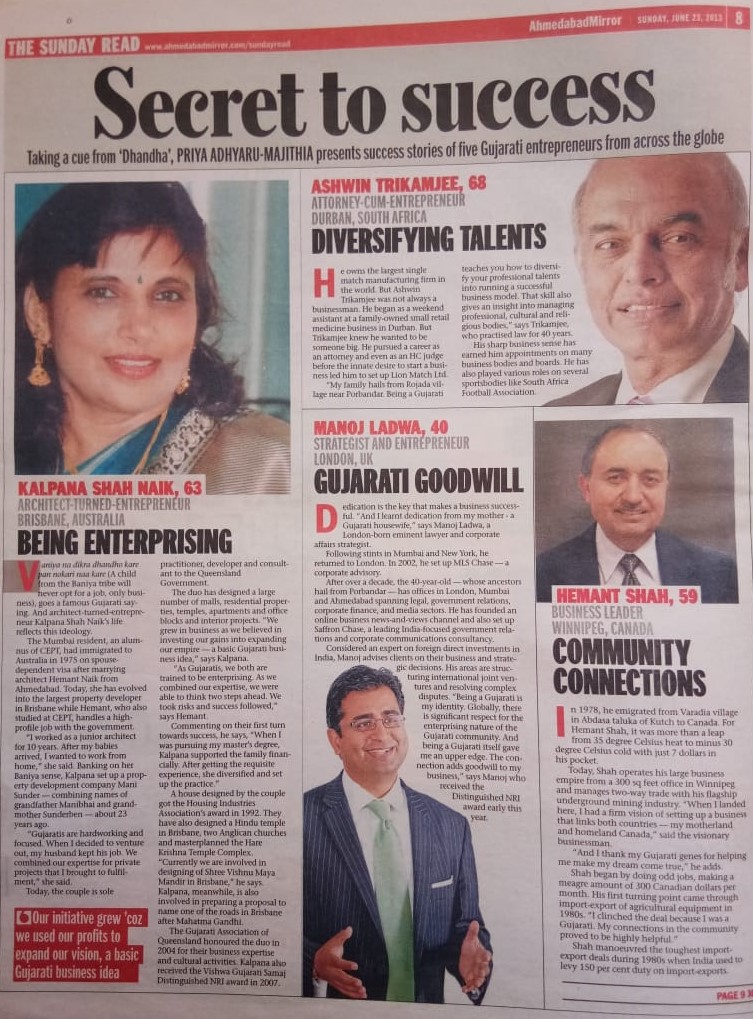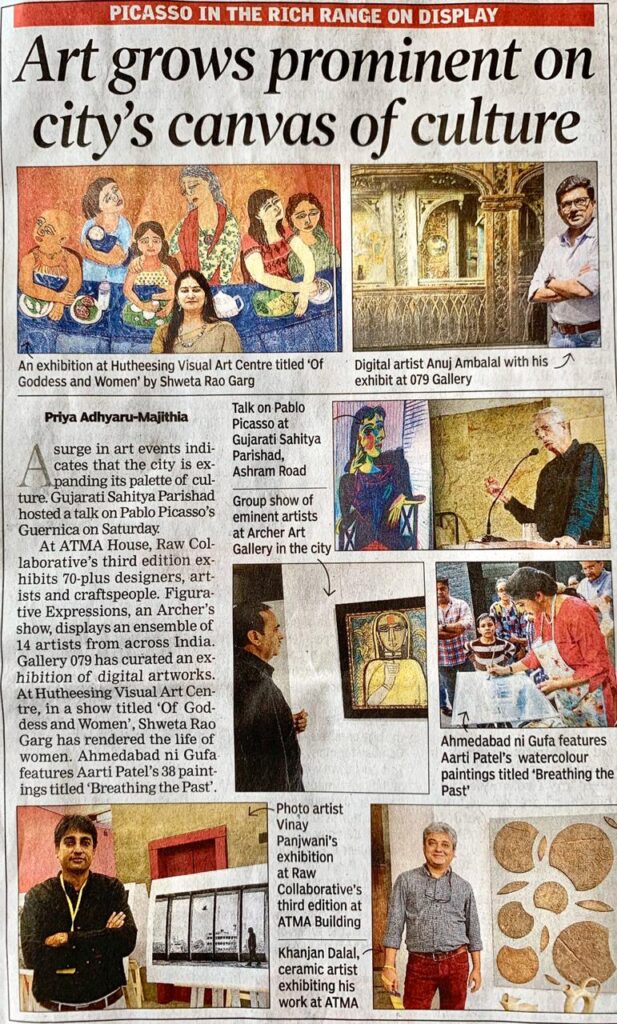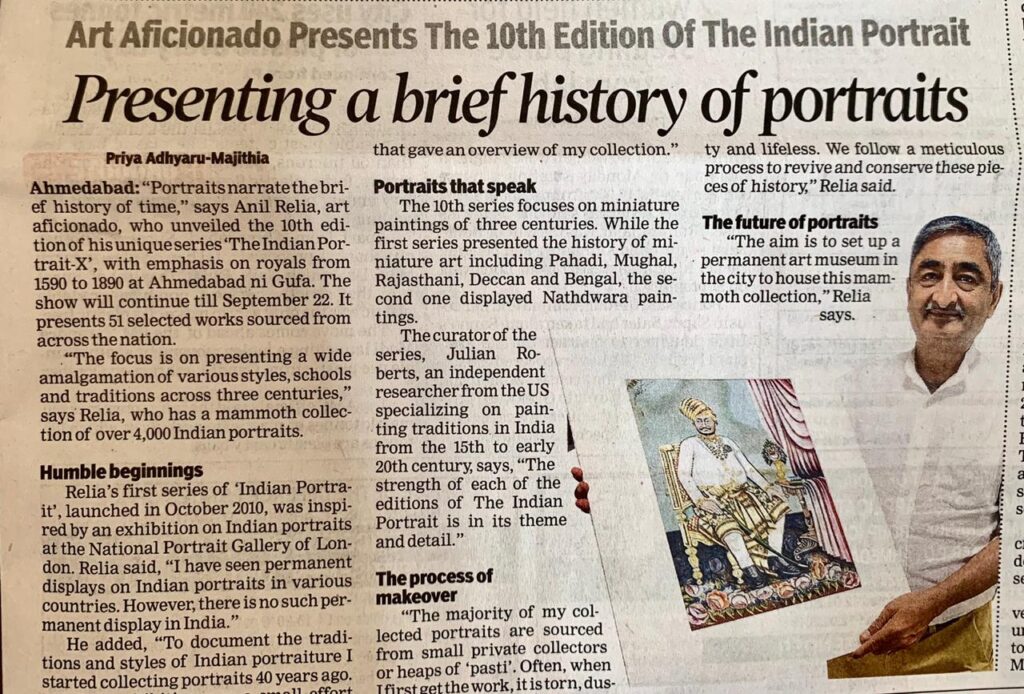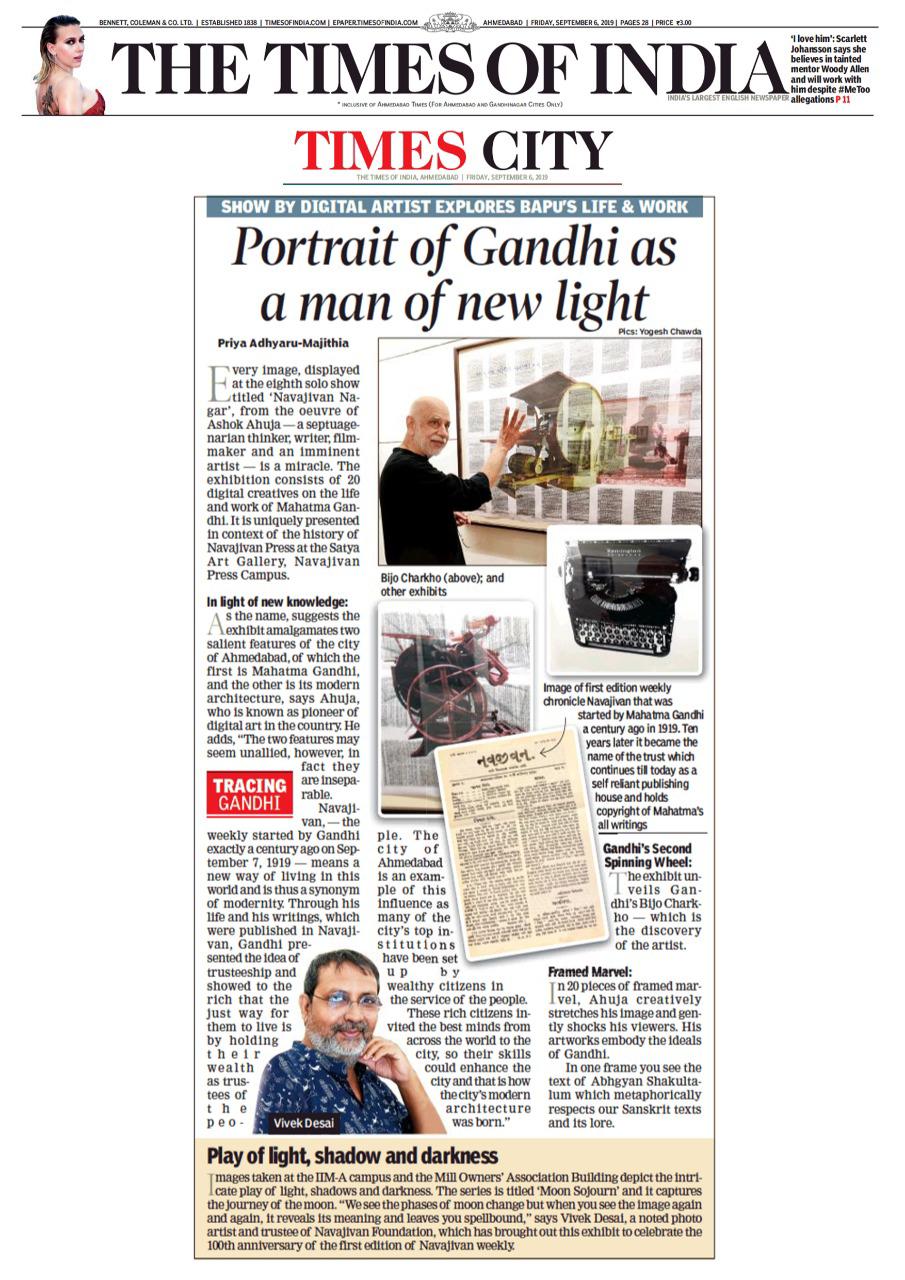
Taking a cue from ‘Dhandha’, PRIYA ADHYARU-MAJITHIA presents success stories of five Gujarati entrepreneurs from across the globe

KALPANA SHAH NAIK, 63
ARCHITECT-TURNED-ENTREPRENEUR BRISBANE, AUSTRALIA : BEING ENTERPRISING
Vaniya na dikra dhandho kare pan nokari naa kare (A child from the Baniya tribe will never opt for a job, only business), goes a famous Gujarati saying. And architect-turned-entrepreneur Kalpana Shah Naik’s life reflects this ideology. The Mumbai resident, an alumnus of CEPT, had immigrated to Australia in 1975 on spouse dependent visa after marrying architect Hemant Naik from Ahmedabad.
Today, she has evolved into the largest property developer in Brisbane while Hemant, who also studied at CEPT, handles a highprofile job with the government. “I worked as a junior architect for 10 years. After my babies arrived, I wanted to work from home,” she said. Banking on her Baniya sense, Kalpana set up a property development company Mani Sunder — combining names of grandfather Manibhai and grandmother Sunderben — about 23 years ago. “Gujaratis are hardworking and focused.
When I decided to venture out, my husband kept his job. We combined our expertise for private projects that I brought to fulfilment,” she said. Today, the couple is sole practitioner, developer and consultant to the Queensland Government. The duo has designed a large number of malls, residential properties, temples, apartments and office blocks and interior projects. “We grew in business as we believed in investing our gains into expanding our empire — a basic Gujarati business idea,” says Kalpana. “As Gujaratis, we both are trained to be enterprising. As we combined our expertise, we were able to think two steps ahead. We took risks and success followed,” says Hemant. Commenting on their first turn towards success, he says, “When I was pursuing my master’s degree, Kalpana supported the family financially. After getting the requisite experience, she diversified and set up the practice.” A house designed by the couple got the Housing Industries Association’s award in 1992. They have also designed a Hindu temple in Brisbane, two Anglican churches and masterplanned the Hare Krishna Temple Complex. “Currently we are involved in designing of Shree Vishnu Maya Mandir in Brisbane,” he says. Kalpana, meanwhile, is also involved in preparing a proposal to name one of the roads in Brisbane after Mahatma Gandhi. The Gujarati Association of Queensland honoured the duo in 2004 for their business expertise and cultural activities. Kalpana also received the Vishwa Gujarati Samaj Distinguished NRI award in 2007.
ASHWIN TRIKAMJEE, 68
ATTORNEY-CUM-ENTREPRENEUR DURBAN, SOUTH AFRICA : DIVERSIFYING TALENTS
He owns the largest single match manufacturing firm in the world. But Ashwin Trikamjee was not always a businessman. He began as a weekend assistant at a family-owned small retail medicine business in Durban. But Trikamjee knew he wanted to be someone big. He pursued a career as an attorney and even as an HC judge before the innate desire to start a business led him to set up Lion Match Ltd. “My family hails from Rojada village near Porbandar. Being a Gujarati teaches you how to diversify your professional talents into running a successful business model. That skill also gives an insight into managing professional, cultural and religious bodies,” says Trikamjee, who practised law for 40 years. His sharp business sense has earned him appointments on many business bodies and boards. He has also played various roles on several sportsbodies like South Africa Football Association.
MANOJ LADWA, 40
STRATEGIST AND ENTREPRENEUR LONDON, UK : GUJARATI GOODWILL
Dedication is the key that makes a business successful. “And I learnt dedication from my mother – a Gujarati housewife,” says Manoj Ladwa, a London-born eminent lawyer and corporate affairs strategist. Following stints in Mumbai and New York, he returned to London. In 2002, he set up MLS Chase — a corporate advisory. After over a decade, the 40-year-old — whose ancestors hail from Porbandar — has offices in London, Mumbai and Ahmedabad spanning legal, government relations, corporate finance, and media sectors. He has founded an online business news-and-views channel and also set up Saffron Chase, a leading India-focused government relations and corporate communications consultancy. Considered an expert on foreign direct investments in India, Manoj advises clients on their business and strategic decisions. His areas are structuring international joint ventures and resolving complex disputes. “Being a Gujarati is my identity. Globally, there is significant respect for the enterprising nature of the Gujarati community. And being a Gujarati itself gave me an upper edge. The connection adds goodwill to my business,” says Manoj who received the Distinguished NRI award early this year.
HEMANT SHAH, 59
BUSINESS LEADER WINNIPEG, CANADA : COMMUNITY CONNECTIONS
In 1978, he emigrated from Varadia village in Abdasa taluka of Kutch to Canada. For Hemant Shah, it was more than a leap from 35 degree Celsius heat to minus 30 degree Celsius cold with just 7 dollars in his pocket.Today, Shah operates his large business empire from a 300 sq feet office in Winnipeg and manages two-way trade with his flagship underground mining industry. “When I landed here, I had a firm vision of setting up a business that links both countries — my motherland and homeland Canada,” said the visionary businessman.
“And I thank my Gujarati genes for helping me make my dream come true,” he adds. Shah began by doing odd jobs, making a meagre amount of 300 Canadian dollars per month. His first turning point came through import-export of agricultural equipment in 1980s. “I clinched the deal because I was a Gujarati. My connections in the community proved to be highly helpful.” Shah manoeuvred the toughest import export deals during 1980s when India used to levy 150 per cent duty on import-exports. “I could manage business and promote trading during the toughest of times primarily as I relied on my sharp business sense and community business connections,” says Shah. Later, Shah expanded his business to include export sectors like mining equipment, agricultural products and machinery, pre-owned aircraft, aircraft parts, aircraft engine overhaul and aviation consulting services.
Today, Shah is an active member of international trade relation and bridges relationships with several government agencies like the Department of Foreign Affairs and International Trade, the Canadian Commercial Corporation, and the Canadian International Development Agency. He has also played a leading role in the deliberation of an MoU between Canada and India to expand trade relations between the countries.
SUNIL NAYAK, 50
MOTELIER, NEW JERSEY, US : HOSPITALITY IS RELIGION
Staying in Gujarat is as good as studying at Harvard Business School, says Sunil Nayak, alumni of St Xavier’s School, Ahmedabad and originator of the biggest world Gujarati conference in the US – Chaalo Gujarat. “Growing up here, one inherits hospitality industry’s golden rule Atithi Devo Bhava (guest is god),” says Nayak who moved from Ahmedabad to the US in 1989 and acquired his first motel in 1992. “Many Gujaratis have succeeded in the hospitality sector in the US as they see hospitality as a religion not just business,” adds Nayak. Within a short span, Nayak has ably expanded his business empire to hold several franchised hotels for Hyatt, Holiday Inn, Hampton Inn, Ramada Inn and Howard Johnson in North-East America.
His biggest achievement, though, is creating Chaalo Gujarat — the biggest community conference which generates big business and brings in large number of Gujarati tourists and visitors to US. With keen networking insight, Nayak established the Association of Indian Americans in North America (AIANA) in 2005 which is one of the largest Indian community organizations in the US. AIANA supports young entrepreneurs achieve their business goals and in turn these entrepreneurs unite their capacities to fulfil the objectives of the organisation. Currently, Nayak is pursuing two big projects via AIANA. The first is to build a permanent structure to provide shelter for troubled Indians in the US, and the second is to build Bharat Bhavan, a permanent museum that depicts Indian culture, tradition and history.
The story appeared as The Sunday Read in Ahmedabad Mirror on page 8 on June 23, 2013


